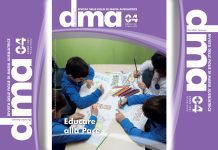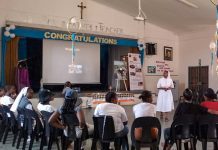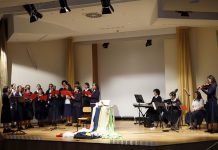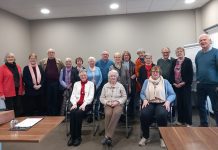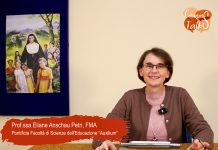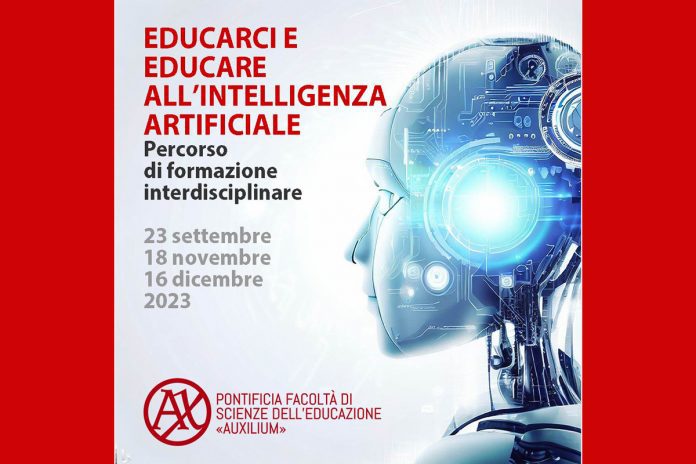Rome (Italy). On 23 September 2023, a study Seminar opened the Interdisciplinary Course organized by the Pontifical Faculty of Educational Sciences “Auxilium” entitled, “Educate ourselves and educate about Artificial Intelligence”.
The topic is highly contemporary and is also in tune with the theme chosen by Pope Francis for the 58th World Communications Day (GMCS 2024) “Artificial intelligence and wisdom of the heart: for fully human communication”, with its educational implications: “Like all revolutions, this one based on artificial intelligence also poses new challenges to prevent machines from contributing to spreading a large-scale system of disinformation and also increasing the loneliness of those who are already alone, depriving us of the warmth that only communication between people can give”.
With the awareness that, in the complexity and speed of innovation and digital transformation, AI crosses various areas of social, professional, and personal life, the Scientific Commission formed by Prof. Enrica Ottone and Maria Antonia Chinello and Prof. Michele Kettmajer, author and designer of digital culture and innovation, Professor of Digital Ethics at the Catholic University of Benguela (Angola) divided this course into three moments.
The objectives of the Course are: to promote reflection on the challenges and opportunities of Artificial Intelligence (AI); explore new scenarios, strategies, and tools for teaching and educational practices; identify some skills to promote to activate effective AI literacy educational courses.
The seminar on 23 September, held in the headquarters of the “Auxilium” Faculty, was attended through invitation by researchers, university professors from various disciplinary fields, professionals, workers and educators, religious women, who found themselves reflecting together on the big questions that challenge us in relation to the topic of education, formation, and Artificial Intelligence, to identify the potential, challenges, dynamics, and communicative and ethical processes of AI and its applications in educational and formation contexts.
Education was the priority option that underpinned the interventions of the speakers who belong to different disciplinary and professional fields. Moderated by Michele Kettmajer, they took turns in the intense and inspirational morning: Enrica Ottone, Piera Ruffinatto, Philip Larrey (Teacher of philosophy at Boston College, Massachusetts), Alessandra Smerilli (Secretary of the Dicastery for Promoting Integral Human Development), Fabio Pasqualetti (Dean of the Faculty of Social Communication Sciences of the Salesian Pontifical University, Michele Pellerey and Dariusz Grzadziel (UPS), Massimiliano Padula and Jessica Romeo (Pontifical Lateran University), Fiorenza Deriu (La Sapienza University), Barbara Volpi (Pontifical Auxilium Faculty), Pina Riccieri (Daughter of St. Paul), Filippo Epifani (Data Engineer, Avanade), Silvana Perfetti (Deloitte) , Pietro Monari (Ammagamma), Daniele Wlderk (Enthous Teatro).
The Seminar was the first step towards the two meetings of the interdisciplinary formation course open to all to explore new scenarios and skills, strategies and tools for teaching and educational practices in and with AI. (Program of the meetings)
On 18 November, Prof. Susanna Sancassani, expert in interaction between technology and learning, Head of the METID Center, the Innovative Methods and Technologies service for Teaching of the Polytechnic of Milan, will hold a conference entitled “Artificial Intelligence: a co-pilot for educational planning.”
On 16 November Prof. Chiara Panciroli, Professor of General Teaching and Educational Technologies at the Department of Educational Sciences of the Alma Mater University of Bologna and scientific director of the “AI and Education” Unit of the Interdepartmental Research Center “Alma for Human-Centered AI”, will talk about “Artificial intelligence and educational opportunities.”
The meetings take place at the «Auxilium» Faculty and are also broadcast in direct streaming on the YouTube Channel of the Faculty.
To register, fill in the registration form online.
Members will be able to take advantage of the resources online for self-formation and, above all, to prepare for the meetings.
Source: pfse-auxilium.org


